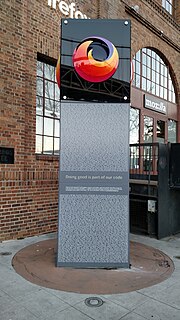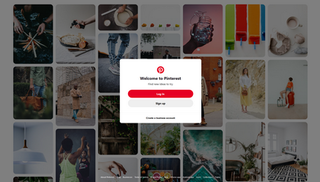Netscape Communications Corporation was an American independent computer services company with headquarters in Mountain View, California and then Dulles, Virginia. Its Netscape web browser was once dominant but lost to Internet Explorer and other competitors in the so-called first browser war, with its market share falling from more than 90 percent in the mid-1990s to less than 1 percent in 2006. Netscape created the JavaScript programming language, the most widely used language for client-side scripting of web pages. The company also developed SSL which was used for securing online communications before its successor TLS took over.
An online community, also called an internet community or web community, is a community whose members interact with each other primarily via the Internet. Members of the community usually share common interests. For many, online communities may feel like home, consisting of a "family of invisible friends". Additionally, these "friends" can be connected through gaming communities and gaming companies. Those who wish to be a part of an online community usually have to become a member via a specific site and thereby gain access to specific content or links.

Second Life is an online multimedia platform that allows people to create an avatar for themselves and have a second life in an online virtual world. Developed and owned by the San Francisco-based firm Linden Lab and launched on June 23, 2003, it saw rapid growth for some years and in 2013 it had approximately one million regular users. Growth eventually stabilized, and by the end of 2017 the active user count had declined to "between 800,000 and 900,000". In many ways, Second Life is similar to massively multiplayer online role-playing games; nevertheless, Linden Lab is emphatic that their creation is not a game: "There is no manufactured conflict, no set objective".
Google Toolbar is a discontinued web browser toolbar for Internet Explorer, developed by Google. It was first released in 2000 for Internet Explorer 5. Google Toolbar was also distributed as a Mozilla plug-in for Firefox from September 2005 to June 2011. On December 12, 2021, the software was no longer available for download, and the website now redirects to a support page.

In interface design, a Tab is a graphical user interface object that allows multiple documents or panels to be contained within a single window, using tabs as a navigational widget for switching between sets of documents. It is an interface style most commonly associated with web browsers, web applications, text editors, and preference panes, with window managers, especially tiling window managers, being lesser known examples.

backstage.bbc.co.uk is the brand name of the BBC's developer network which operated between May 2005 and December 2010.

In computing, a news aggregator, also termed a feed aggregator, feed reader, news reader, RSS reader or simply an aggregator, is client software or a web application that aggregates syndicated web content such as online newspapers, blogs, podcasts, and video blogs (vlogs) in one location for easy viewing. The updates distributed may include journal tables of contents, podcasts, videos, and news items.

The Mozilla Corporation is a wholly owned subsidiary of the Mozilla Foundation that coordinates and integrates the development of Internet-related applications such as the Firefox web browser, by a global community of open-source developers, some of whom are employed by the corporation itself. The corporation also distributes and promotes these products. Unlike the non-profit Mozilla Foundation, and the Mozilla open source project, founded by the now defunct Netscape Communications Corporation, the Mozilla Corporation is a taxable entity. The Mozilla Corporation reinvests all of its profits back into the Mozilla projects. The Mozilla Corporation's stated aim is to work towards the Mozilla Foundation's public benefit to "promote choice and innovation on the Internet."

Christopher Reaves Messina is an American blogger, product consultant and speaker who is the inventor of the hashtag as it is currently used on social media platforms. In a 2007 tweet, Messina proposed vertical/associational grouping of messages, trends, and events on Twitter by the means of hashtags. The hashtag was intended to be a type of metadata tag that allowed users to apply dynamic, user-generated tagging, which made it possible for others to easily find messages with a specific theme or content. It allowed easy, informal markup of folksonomy without need of any formal taxonomy or markup language. Hashtags have since been referred to as the "eavesdroppers", "wormholes", "time-machines", and "veins" of the Internet.
How do you feel about using # (pound) for groups. As in #barcamp [msg]?
Social media optimization (SMO) is the use of a number of outlets and communities to generate publicity to increase the awareness of a product, service brand or event. Types of social media involved include RSS feeds, social news, bookmarking sites, and social networking sites such as Facebook, Instagram, Twitter, video sharing websites, and blogging sites. SMO is similar to search engine optimization (SEO)in that the goal is to generate web traffic and increase awareness for a website. SMO's focal point is on gaining organic links to social media content. In contrast, SEO's core is about reaching the top of the search engine hierarchy. In general, social media optimization refers to optimizing a website and its content to encourage more users to use and share links to the website across social media and networking sites.
A social news website is a website that features user-posted stories. Such stories are ranked based on popularity, as voted on by other users of the site or by website administrators. Users typically comment online on the news posts and these comments may also be ranked in popularity. Since their emergence with the birth of Web 2.0, social news sites have been used to link many types of information, including news, humor, support, and discussion. All such websites allow the users to submit content and each site differs in how the content is moderated. On the Slashdot and Fark websites, administrators decide which articles are selected for the front page. On Reddit and Digg, the articles that get the most votes from the community of users will make it to the front page. Many social news websites also feature an online comment system, where users discuss the issues raised in an article. Some of these sites have also applied their voting system to the comments, so that the most popular comments are displayed first. Some social news websites also have a social networking service, in that users can set up a user profile and follow other users' online activity on the website.

Robert Kevin Rose is an American Internet entrepreneur who co-founded Revision3, Digg, Pownce, and Milk. He also served as production assistant and co-host at TechTV's The Screen Savers. From 2012 to 2015, he was a venture partner at GV.

Digg, stylized in lowercase as digg, is an American news aggregator with a curated front page, aiming to select stories specifically for the Internet audience such as science, trending political issues, and viral Internet issues. It was launched in its current form on July 31, 2012, with support for sharing content to other social platforms such as Twitter and Facebook.

A paywall is a method of restricting access to content, with a purchase or a paid subscription, especially news. Beginning in the mid-2010s, newspapers started implementing paywalls on their websites as a way to increase revenue after years of decline in paid print readership and advertising revenue, partly due to the use of ad blockers. In academics, research papers are often subject to a paywall and are available via academic libraries that subscribe.

Google Lively was a web-based virtual environment produced by Google Inc.. It was discontinued on December 31, 2008.

Although Internet censorship in Germany has traditionally been rated as low, it is practised directly and indirectly through various laws and court decisions. German law provides for freedom of speech and press with several exceptions, including what The Guardian has called "some of the world's toughest laws around acclaimed propaganda". An example of content censored by strict German law are resources meant to enlighten citizens about the Holocaust due to "inaccurate portrayal of history". If caught viewing censored information the German government can punish the viewer up to 15 years in prison as of a court date ruled in early 2000's. According to the Google Transparency Report, the German government is frequently one of the most active in requesting user data after the United States.
Jigsaw LLC is a technology incubator created by Google. As of February 2020, it is under Google management and used to operate as an independent subsidiary of Alphabet Inc. Based in New York City, Jigsaw is dedicated to understanding global challenges and applying technological solutions, from "countering extremism", online censorship and cyber-attacks, to protecting access to information. Jared Cohen, formerly with the Policy Planning Committee at the US State Department, is the CEO of Jigsaw, and was formerly co-founder and director of Google Ideas.

Pinterest is an image sharing and social media service designed to enable saving and discovery of information on the internet using images, and on a smaller scale, animated GIFs and videos, in the form of pinboards. The site was created by Ben Silbermann, Paul Sciarra, and Evan Sharp, and had over 478 million global monthly active users as of March 2021. It is operated by Pinterest, Inc., based in San Francisco.

A like button, like option, or recommend button is a feature in communication software such as social networking services, Internet forums, news websites and blogs where the user can express that they like, enjoy or support certain content. Internet services that feature like buttons usually display the number of users who liked each content, and may show a full or partial list of them. This is a quantitative alternative to other methods of expressing reaction to content, like writing a reply text. Some websites also include a dislike button, so the user can either vote in favor, against or neutrally. Other websites include more complex web content voting systems, for example five stars or reaction buttons to show a wider range of emotion to the content.

Mozilla is a free software community founded in 1998 by members of Netscape. The Mozilla community uses, develops, spreads and supports Mozilla products, thereby promoting exclusively free software and open standards, with only minor exceptions. The community is supported institutionally by the non-profit Mozilla Foundation and its tax-paying subsidiary, the Mozilla Corporation.














